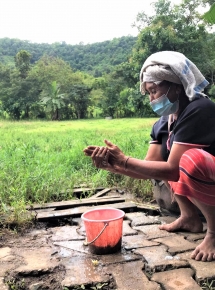COVID-19 and household water insecurities in vulnerable communities in the Mekong Region
Access to sufficient clean water is important for reducing the risks from COVID-19. It is unclear, however, what influence COVID-19 has had on water insecurities. The objective of this study was to assess the associations between COVID-19 control measures and household water insecurities. A survey of 1559 individuals living in vulnerable communities in five countries (Cambodia, Laos, Myanmar, Thailand, Vietnam) showed that increased needs for clean water to wash hands or facemasks made it more likely a person was water insecure along those dimensions.
Water insecurities with respect to handwashing and drinking, in turn, made adoption of the corresponding good practices less likely, whereas in the case of washing facemasks there was no association. Water system infrastructure, environmental conditions such as floods and droughts, as well as gender norms and knowledge, were also important for water insecurities and the adoption of good practices. As domestic water insecurities and COVID-19 control measures are associated with each other, efforts should therefore be directed at identifying and assisting the water insecure at high risk when COVID-19 reaches their communities.
---------------------
Louis Lebel, Hap Navy, Phoummixay Siharath, Chau Thi Minh Long, Nilar Aung, Phimphakan Lebel, Chu Thai Hoanh & Boripat Lebel, COVID-19 and household water insecurities in vulnerable communities in the Mekong Region. Environ Dev Sustain (2022). https://doi.org/10.1007/s10668-022-02182-0
Received 06 October 2021/ Accepted 01 February 2022/ Published 25 February 2022
Author(s)
Louis Lebel
Navy Hap
Phoummixay Siharath
Chau Thi Minh Long
Nilar Aung
Phimphakan Lebel
Chu Thai Hoanh
Boripat Lebel
Published
2022
Topic
Publisher
Project
Phase
S4A

 Read more about SUMERNET
Read more about SUMERNET
